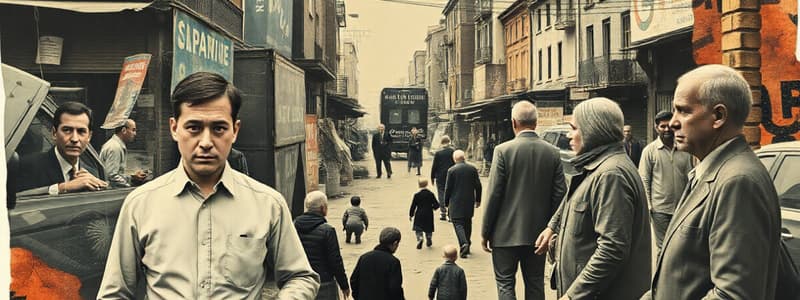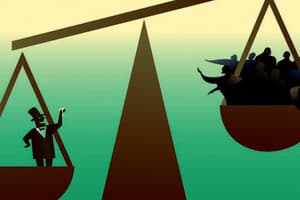Podcast
Questions and Answers
Tab's remarks about the poor primarily reflect which viewpoint?
Tab's remarks about the poor primarily reflect which viewpoint?
- A belief in personal responsibility and the idea that success is solely determined by individual effort.
- An objective analysis of economic disparities and their impact on different social classes.
- A compassionate concern for the systemic issues trapping individuals in poverty.
- A detached perspective, seeing the poor as problems to be managed rather than individuals deserving empathy. (correct)
Kat's responses to Tab suggest what about her perspective on poverty?
Kat's responses to Tab suggest what about her perspective on poverty?
- She is indifferent to the issue of poverty and only engages in the conversation out of politeness.
- She holds a more nuanced perspective, acknowledging systemic issues and individual struggles. (correct)
- She fully agrees with Tab but is hesitant to express her views openly.
- She believes that poverty is entirely the fault of the individuals experiencing it.
MJ's reaction to Tab and Kat's conversation suggests that she:
MJ's reaction to Tab and Kat's conversation suggests that she:
- Agrees with Tab's assessment of the poor and is angered by Kat's disagreement.
- Misunderstands the conversation and leaves in confusion.
- Is indifferent to the conversation and leaves because she has other obligations.
- Is personally affected by their conversation and feels a sense of injustice. (correct)
Which of the following statements best captures the central theme of the scene?
Which of the following statements best captures the central theme of the scene?
What does the narrator's final statement imply about the role of the poor in the world described?
What does the narrator's final statement imply about the role of the poor in the world described?
Flashcards
Dismissive View of the Poor
Dismissive View of the Poor
A perspective held by some wealthy individuals who view poverty as a result of laziness, lack of ambition or bad choices.
The 'Trap' of Endless Work
The 'Trap' of Endless Work
A system where individuals work tirelessly but receive minimal compensation, barely enough to survive.
Lack of Opportunity
Lack of Opportunity
The idea that those born into poverty lack equal opportunities or chances for advancement.
Rising Anger at Injustice
Rising Anger at Injustice
Signup and view all the flashcards
Invisibility of the Poor
Invisibility of the Poor
Signup and view all the flashcards
Study Notes
- The scene portrays a world of luxury where the poor are treated as disposable and misunderstood by the wealthy.
- Tab believes the poor lack hope and ambition, wallowing in their misery.
- Kat acknowledges some poor people work hard despite having nothing.
- Tab considers hard work a trap where employees work endlessly for barely enough to survive, stuck in a system designed for them to fail.
- Tab questions why the wealthy should help the poor, who she claims have children they cannot afford and expect the wealthy to clean up their mess.
- Kat argues the poor do not choose their circumstances and some do not even have a chance.
- MJ overhears the conversation and leaves in anger and frustration.
- Tab dismisses MJ as just another dissatisfied employee.
- The poor are invisible in a world built on privilege, their struggles forgotten unless they serve the wealthy.
Studying That Suits You
Use AI to generate personalized quizzes and flashcards to suit your learning preferences.




